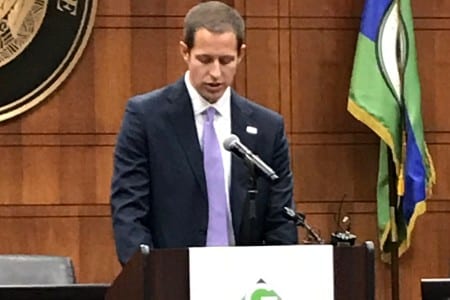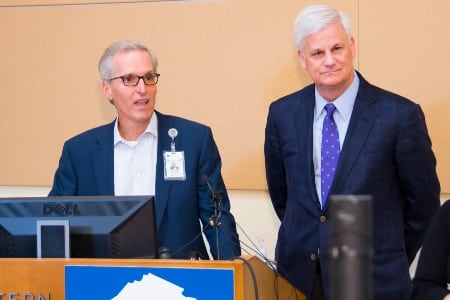In the battle against the spread of COVID19, personal protective equipment, such as N95 respirator masks and surgical gloves, have become in short supply across the country.
“North Carolina’s hospitals and healthcare professionals are thankful for the governor’s leadership and his shelter-in-place order, which we believe will help change the trajectory of cases in our state,” said Steve Lawler, NCHA President & CEO. “We understand that such an order was not considered lightly, and we believe this is a vital step to immediately impact the spread of the virus. The Governor’s decision will not only help position our state’s healthcare system to be prepared for a surge of patients, but more importantly, it will also save lives.”
Concerns about the multiplying effect of social spread, as seen in other states, and the ability to safeguard staff, precious supplies, and resources, led NCHA to request the shelter-in-place order in a letter to Gov. Cooper on Monday. The letter echoed concerns shared by healthcare leaders across the state, from the CEOs of Atrium Health and Novant Health, who signed a joint letter to Mecklenburg County commissioners, to a joint public letter by the CEO of Vidant Health and the dean of East Carolina University’s Brody School of Medicine.
“We believe it will take at least two weeks following the shelter-in-place order for the number of cases in our state to decline,” Lawler said. “We cannot know exactly how soon this action will flatten the curve, because we don’t have the data to fully know the current level of infections. We appreciate Governor Cooper and other state, county, and local leaders across North Carolina for making decisions that will help us quickly overcome this pandemic. We are also forever grateful to all of our state’s healthcare workers for putting their lives on the line for our neighbors and communities.”
Connelly said after conversations with health officials, emergency management and other members of the Greenville City Council, it was clear this order was needed to help contain the virus that is spreading throughout North Carolina.
As of 11 a.m. on Wednesday, there were 504 positive tests in North Carolina and one death from COVID-19.
“I would also like to note that a statewide order such as this would be ideal as it would establish consistency in our battle against the virus,” Connelly said. “But just like all of you, we can only do our part. I would like to urge all others in the East and around the state to join us in taking such action.”
Vidant Health CEO Dr. Michael Waldrum thanked Mayor Connelly and the city council for taking action to help stop the spread of COVID-19. Earlier this week, leaders from Vidant Health and Brody School of Medicine at East Carolina University called on local and state officials to take firm action in their areas to keep communities safe.
Other officials, including Congressman Dr. Greg Murphy and Representative Perrin Jones, also spoke during a Wednesday press conference announcing the order.
“At Vidant Health we have been and will continue to prepare and to assure that we are able to take care of the people of eastern North Carolina, Pitt County and Greenville,” Dr. Waldrum said.
Notably, the protection of caregivers, nurses and doctors is vitally important. Keeping these members of our community safe will help improve all outcomes of this pandemic.
“With that, I want to thank all of our physicians, nurses, technicians and so many people that have spent countless hours preparing and taking care of patients,” Dr. Waldrum said, “and putting themselves, frankly, in the line of fire to make sure that we take care of the people that need care.”
Murphy said he was in full support of the action taken by Mayor Connelly and the Greenville City Council, as well as the similar action taken by Pitt County. He said the order and those similar are made to keep people safe and to avoid overwhelming health care resources in the area.
While he urged state leaders to take action, he also called on the counties in his district to follow Greenville and Pitt County’s lead to keep citizens safe.
“It really won’t do much for us to be a piecemeal enclave in an epidemic and pandemic, we need other counties and other cities to join us in this effort,” Murphy said. “Unless we do that we’re going to be an island and really won’t be effective in keeping this disease at bay.”
Connelly said the order will be reviewed often to determine best steps.
Read the full ordinance from Mayor Connelly and the Greenville City Council.
This pandemic has turned into a wave that is rolling across our country, hitting our state and threatening eastern North Carolina. The data are clear: it has started to impact our region and the problem continues to grow.
We can’t stop this wave from hitting us. However, we can lessen its impact here and now in eastern North Carolina. The question is whether we will take the necessary actions to reduce the spread of the virus. When you see the disasters affecting communities around the world, you are seeing the towns, cities, regions or countries that did not take action to slow or stop the wave. What you don’t see are the ones that are not suffering as much. The ones whose health care system is able to respond to the demand. The ones whose economies are already recovering. These are the stories of the communities who took the actions to slow the wave. What we do now will determine our story.
The fact is we have a short window of opportunity, as the virus is moving much faster than we normally make decisions. We know the story and outcome if we do nothing more – we see it on the news and on social media every day. We know from history that bold and definitive actions can change the course for the better.
Hospitals throughout North Carolina have and continue to take measures to respond to the COVID-19 wave. This includes all nine Vidant hospitals serving eastern North Carolina. It is time for communities to make similar definitive and decisive decisions to protect our region.
Each of us has a responsibility to act immediately and to take action to help our communities respond to this crisis. Now, more than ever, we need every person, organization and government agency working together to protect our loved ones.
Practice social distancing, stay home as much as possible, call before visiting a health care facility if you have a fever, respectfully encourage others through social media to do their part. These actions, combined with every day hygiene habits like proper handwashing, coughing and sneezing into the crook of your arm and cleaning surfaces, will help us flatten the curve and keep our loved ones healthy.
We are calling on local officials throughout eastern North Carolina and the state to take more decisive action in response to this crisis to include making the bold and right decision to ask North Carolinians to shelter in place. This means staying close to home as much as possible and only going out if absolutely necessary, such as buying groceries or picking up medications. This is the right thing to do to save lives and is the right thing for our long-term economic interests. Community members must encourage the political bodies to be decisive, take action now and then support them.
We would also like to thank all health care workers and every person on the front lines for their tireless efforts to care for those in need. This is a difficult time for doctors, nurses and care teams. We stand ready to care for those in our region, but we need local communities to do their part.
We are confident we can flatten the curve. However, we must all stand up together, as one community, to get through this crisis.
Michael Waldrum, MD
Chief Executive Officer, Vidant Health
Mark Stacy, MD
Dean, Brody School of Medicine
Vice Chancellor for Health Sciences
East Carolina University
Our two institutions have been preparing since the beginning of January for the likelihood that this disease will impact our region.
If you are planning to visit a Vidant hospital or clinic, be aware that the following visitor restrictions are in place to protect against the spread of COVID-19:
- Only one, immediate family member, over the age of 16 and not exhibiting any symptoms of illness may visit a hospital or accompany a patient to an appointment.
This applies to all hospital, clinics and emergency departments. Specific information about our preparedness and restrictions is available at VidantHealth.com/COVID-19.
ECU has a multi-phase response plan in place that will enable us to seamlessly adjust our operations as the COVID-19 situation evolves to ensure the health and safety of our patients, staff and learners. We have also implemented enhanced screening protocols for patients and provided additional training to our faculty, students and staff on COVID-19. Specific information about our university’s preparedness and response is available at news.ecu.edu/coronavirus-updates.
We also have virtual care options available including ECU HealthNow and the ECU Physicians Virtual Visit option, which ECU Physicians patients can access by calling their primary care clinic.
Community members can reduce their risk of exposure by following prevention recommendations from the Centers for Disease Control and Prevention (CDC), including:
- Washing hands with soap and water regularly
- Avoid touching your eyes, nose and mouth
- Sneezing and coughing into a tissue or your elbow
- Cleaning and disinfecting frequently-touched surfaces daily
- Practicing social distancing and avoiding large gatherings
If you are concerned that you may have been exposed to COVID-19 and have symptoms of fever, cough and/or shortness of breath, it is important for you to contact your health care provider for guidance before heading to a doctor’s office or hospital.
For more than 40 years, we have proudly served this region with high-quality health care and the coming days will be no different.
We understand these are unsettling times, but Vidant Health and East Carolina University are prepared and committed to caring for you, your family and your community – not just during this most recent pandemic, but every day.
Michael Waldrum, MD
Chief Executive Officer, Vidant Health
Mark Stacy, MD
Dean, Brody School of Medicine
Vice Chancellor for Health Sciences
East Carolina University
Read more from The Daily Reflector


